Dwight’s youngest brother was Milton Eisenhower.
Dwight Eisenhower was the third of seven boys born to a family of Jehovah’s Witnesses in Texas, later growing up in Abilene, Kansas. Dwight’s youngest brother was Milton (1899-1985).
The Eisenhower siblings were:
Arthur (1886-1958)
Edgar (1889-1971)
Dwight (1890-1969)
Roy (1892-1942)
Paul (1894-1895)
Earl (1898-1968)
Milton (1899-1985)
The Eisenhower Presidential Library obliquely says that Milton “worked for the federal government” after graduation. What they omit is that he worked for the Department of Agriculture from 1926-1942, and most prominently for Agriculture Secretary Henry A. Wallace from 1933-1940 when Wallace left the Department to become Vice President.
After that, Eisenhower worked to plan out Japanese internment for FDR.

Henry Wallace was a Soviet apologist and possibly their active agent. Everyone around Henry Wallace was a Communist through and through. Wallace toured Soviet death camps in 1944, and his aide for the trip Owen Lattimore wrote glowingly of the camps and area in National Geographic in December 1944. It would take another five years before the extent of Soviet camp atrocities would become more widely accepted to the point where Henry was forced to disavow.
Milton Eisenhower worked as the speechwriter and press agent for Wallace for nearly the first two terms of FDR, up to 1941. He “sold the New Deal” as I saw it described elsewhere.
Milton graduated from Kansas State in 1924. He spent two years as a consulate officer in Scotland with the intent to return to Kansas State to teach journalism. He’s picked in 1926 to work with the Department of Agriculture, alongside a new Secretary who is the former President of KState, William Jardine.
Milton Eisenhower is married in Washington in October 1927 with Secretary of Agriculture Jardine in attendance. So the progression here is journalism adjunct professor to consulate officer to Ag press officer to running the Ag press office, all in the period of four years.
That’s not impossible, but it’s pretty rare.
Going from adjunct to the “Director of Information” in that period of time feels like there was an artificial lift in the background. Let’s call this the first suspicious leap.
Eisenhower had a 1924 degree from Kansas State in “Industrial Journalism.”
After working for Wallace, Milton leaves the Dept. of Agriculture in 1941 and then didn’t work until mid-1942. This is a suspicious gap of time two.
Then FDR appointed him to the “War Relocation Board” where he worked for three months in 1942 planning and coordinating Japanese internment. This is suspicious leap three. It’s not normal to go from being a press agent to running a wartime department.
Some dissidents now allege that the internment operation was really a plan by organized crime to confiscate Japanese assets wholesale in California.
That thesis seems a bit outlandish until you consider the fact that Hawaii had in 1941, and continues to have until this day, a vast majority of its population being of Japanese descent. There were well-known Japanese spies operating in Hawaii, a fact known to the federal government in Pearl Harbor and throughout Hawaii.
Those Hawaiian Japanese with many spies were left unmolested, but 100,000 in California were rounded up based on Census data and had their properties confiscated. There’s no logic to any of this.
And yet this was Milton Eisenhower’s job: planning and coordinating the roundup of American citizens and stealing their businesses and properties.
Eisenhower only had this position from March through June of 1942. In some later tellings he “resigned in protest” but I’m skeptical of that being a post-hoc cover for the policy.
Here Milton is in April of 1942 planning the ‘mass relocation’ of the Japanese:
Then there’s another gap, this time from June 1942 through May of 1943. In November of 1942, Milton is listed as an ‘advisor’ to Elmer Davis at the Office of War Information. During this period of time Milton’s brother Dwight, then a Lt. General, sent Milton to North Africa to survey the troops and report back in January 1943. We’ll call this suspicious gap four.
Then his next position is as President of his alma mater, Kansas State, starting in May 1943. Let’s call this suspicious leap five.
Milton went from adjunct to President in less than twenty years, without any graduate degree, and without being at the institution during that period of time. If you can show me anyone else with that career path, I’d like to hear about it.
Eisenhower is at KState from 1943 to 1950, and then is President of Penn State from 1950-1956, and then in 1956 is named President of Johns Hopkins University in Baltimore from 1956 to 1967 when he retires, and then is brought back for one year in 1971-1972.
This is suspicious leap six. It’s suspicious because he goes from agriculture and farm schools, to an urban liberal arts college.
Johns Hopkins was also the undergrad alma mater of Alger Hiss, ‘26, and was the academic home of Owen Lattimore from 1938 to 1963. Hiss was born and raised in Baltimore, and was always a social climber, so that’s less suspicious frankly than Lattimore who, similar to Eisenhower, did not have an advanced degree. In Lattimore’s case, he had no higher education beyond secondary schooling.
There are a few schools whose backgrounds are always suspicious: Johns Hopkins and Columbia. Almost every Soviet spy during the Cold War intersects at some point with Columbia University.
This move for Milton from Penn to Johns Hopkins was not only odd to me now, it was even acknowledged as an odd move by Eisenhower himself.
And of course it gets weirder.
When Milton was named as head of Johns Hopkins, newspaper articles went through his background.
It’s a small thing, but the main Associated Press puff piece about Eisenhower’s announcement was written by a Johns Hopkins alum.
William B. Harwood was a 1946 graduate of Johns Hopkins.
Anyway, here’s an interesting piece about Milton Eisenhower’s appointment in the Washington Star from 1956.
Let me zero in on the biographical note that never gets mentioned in any of Milton’s other biographies for some reason:
Who in 1946 would have thought the President of Kansas State was a good fit for Assistant Secretary General of the UN?
Who would have chosen someone with no graduate degree and a background in American agriculture for a position as an internationalist generalist?
Who would have plucked someone from obscurity in Manhattan, Kansas to go live and work in the better-known Manhattan?
Who would have known Milton from the time they worked together in the administrative end of the Department of Agriculture?
Who was the one making these decisions in February 1946? Who was working to set up the United Nations at this time as their sole job? Who was the head of policymaking at the U.S. State Department as the “Director of the Office for Special Political Affairs” during this period of time?
Oh dear reader, I truly cannot wait to tell you…
It was Alger Hiss.

Let’s make sure we all realize the significance of what I just said: Alger Hiss offered a job to Milton Eisenhower in 1946 while he was the President of Kansas State University to be the Assistant Secretary General of the United Nations.
This is six years before Milton’s brother would become President, and four years before Alger would be serving time at Lewisburg, Pennsylvania for perjury.
And do you know who was on the board of the Carnegie Foundation where Hiss worked after setting up the United Nations? Dwight D. Eisenhower.
Milton turned Hiss down to work at the UN. They clearly knew each other, and perhaps knew each other from their time together at Henry Wallace’s Department of Agriculture when Hiss and Eisenhower overlapped there together from 1933-1935. Hiss was one of two General Counsels for the Department, and Eisenhower was leading the Press Office.
Maybe it’s best Milton didn’t take the job. Hiss’s good friend Abraham Feller, who was the General Counsel for the UN, suspiciously committed suicide in 1952 by throwing himself out a building. Or so we’re told.

That was a common problem for friends of Alger. Laurence Duggan had the same fate four years prior.

If, as I allege, that Soviet agents were infiltrated across the government not just for espionage and intelligence, which is the dominant thesis today, but were there as I contend to also actually influence and affect policy, what does it say that Hiss offered Eisenhower this position? Eisenhower clearly lacked the qualifications for this job, so Hiss was taking a bit of a risk on making the offer.
Why would Eisenhower have been worth the risk? I don’t have the answer, but it’s surprising to me that this nugget isn’t even mentioned anywhere else about Milton or about Hiss.
Another odd Eisenhower family fact, from the Eisenhower Library website, is that Dwight’s oldest brother Arthur, four years older than Dwight, went into banking in Kansas City. While there, he lived in a boarding house when he was starting out. One of his fellow boarders was Harry S Truman.
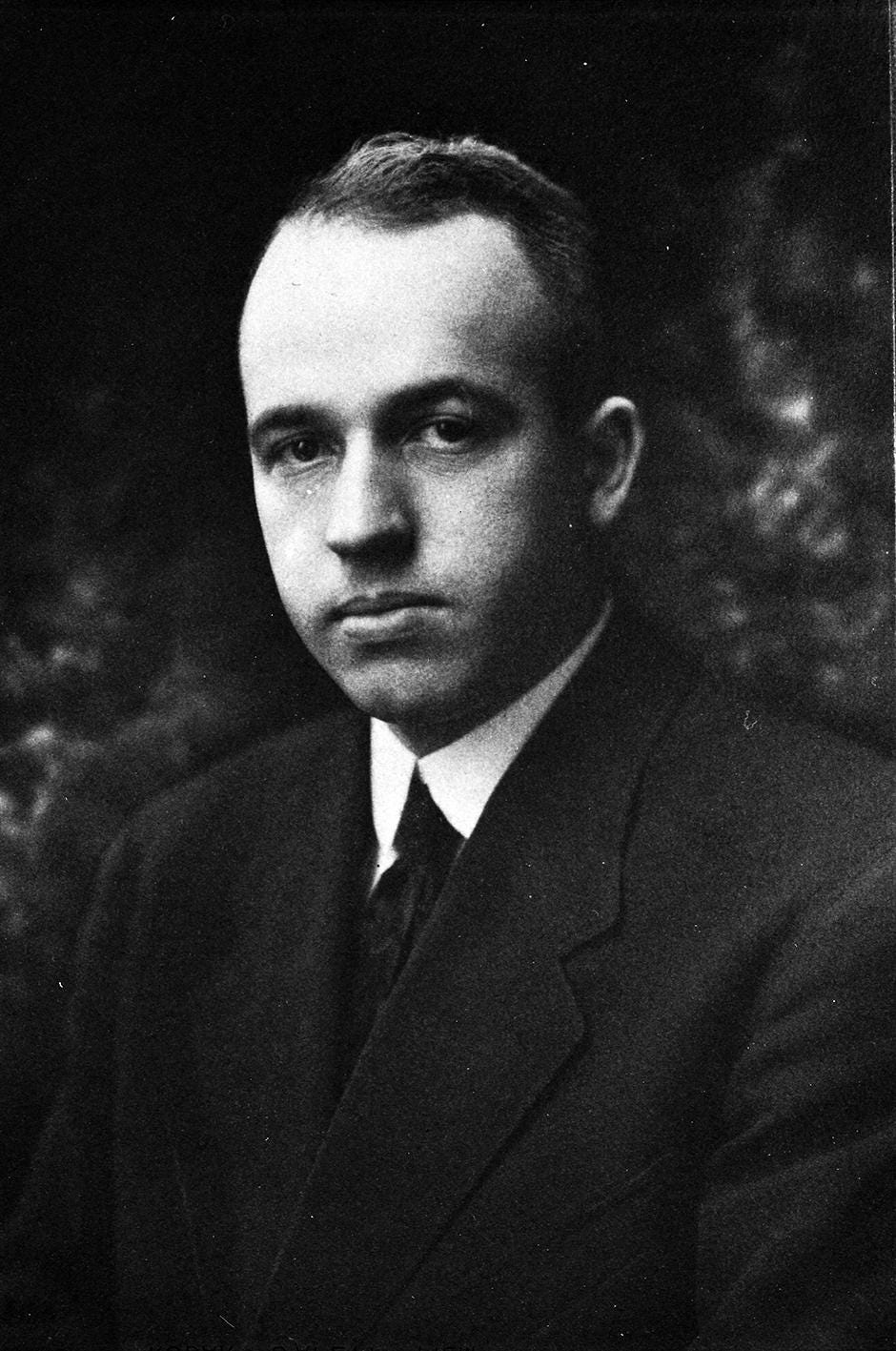
Eisenhower brother Arthur, the banker, met with the Secretary of Agriculture when he was visiting in Kansas City when younger brother Milton was just a college student. So Arthur was decently politically connected.
The nexus here of current power in the mid-20s with a guy with direct personal connections to two future Presidents back to back two decades later? I mean, coincidences happen but this one is pretty odd.
There are no obvious connections to the Pendergast organized crime syndicate that most historians now admit helped put Truman into early office.
Pendergast is considered to have ‘run’ Kansas City for organized crime during this period of time, roughly from 1900-1940. Arthur Eisenhower retired in 1956, so for the bulk of his professional life in Kansas City banking, he was operating a bank in the city concurrently with Pendergast’s political power.
Truman always downplayed his relationship with Pendergast but never denied it. I can’t find much connecting Arthur Eisenhower to Tom Pendergast, but they were certainly in the same general social circles.
The way all this connects, however, is through Milton’s first job after Kansas State: working for “Associated Companies” which is about as bland of a corporate name as I can imagine. It was a brand new utility and power company in the area in 1922.
If you study the ascent of Lyndon Johnson further south you note a similar pattern, around a similar period of time, with a similar company. In Johnson’s case it was Pedernales Electric Cooperative. I actually tried to run for the PEC board once, but they disqualified all the signatures I collected. It was my fault for having the son of a Supreme Court Justice collect my signatures I suppose.
Anyway, LBJ financed his life off of PEC by having the federal government make all the capital purchases for the utility, and then charged normal rates to customers. It’s easy to make a profits when Uncle Sam is paying all your expenses. LBJ was also wise to have dozens of his closest friends enjoy six-figure salaries as directors of PEC, who all had plenty of money to donate to his campaigns and other ventures.
I don’t know if this is the game the Eisenhowers were running, but frankly I suspect it is. Arthur made contact with the new utility, he had his brother the Kansas City banker able to ensure the finance end of the business, and he had the star power of his brother to get everything else he needed done politically. It was the LBJ playbook with all the right familial connections to make it happen. If there’s a new utility going up in the area, I’m sure you’re going to be required to pay off local crime boss Pendergast as well.
The Eisenhowers, if this is true, were a little more like the white collar version of the more blue collar LBJ operation in the Hill Country, Texas.
It’s just odd that this farm family of seven ends up with this many connections into business, politics, and academia.
It’s odd that Milton ends up running public state schools and then an elite private college in Maryland.
And it’s odd that his brother Dwight was offered the chance to run Columbia University in NYC.
Even if you were to choose one Eisenhower and not the other in 1948, Milton was the more obvious choice. So the selection of Dwight, and not Milton, as head of Columbia University seems to be entirely out of place.
Even far-left discredited Snopes.com ran an article debunking a rumor that Columbia meant to choose Milton and not Dwight and did so by accident.
The official story is that major funder Tom Watson of IBM was the one who pushed Eisenhower to be Columbia’s President, started to lobby Eisenhower to this end in 1946. There is a book about this topic, written by a Columbia grad, which I have not read yet.
Watson was a long-time Democrat. Watson’s son was Ambassador to the Soviet Union in the last two years of the Carter administration.
Eisenhower at this time was not partisan and not especially political. He was, according to mainstream sources, being courted for higher office by both political parties.
It’s certainly the case that Dwight and Milton were never around people who were politically on the right. They were clearly much more comfortable around elites and left-wing folks.
One iconic cultural moment from Eisenhower’s tenure as President is the infamous “military-industrial complex” speech.
In case you forgot it, you can read it here or view it here.
This speech, today, has oddly been appropriated by both right and left.
The left takes it as a way to attack defense spending and right-wing budget priorities and allowing it to ease into their overall foreign policy perspective of disarmament and weakness.
The right takes it to illustrate some sense of a deep state and permanent hidden lobby interests that ultimately corrupt American politics. This interpretation obviously takes a few mental gymnastics, though their conclusions are essentially correct.
But the plain text of the speech was meant to help the political left. The content of the speech is disarmament at the height of the Cold War, in the face of potential Communist global conquest.
Communism rarely sought to advance its interests through the application of military power. They would rather undermine the target country and have it toppled from within, and then have a revolutionary government adopt rigid ideological policies. Communist imperialism was not expanded at the end of an invading army, but rather an internal insurgency.
You tenderize the steak before you fillet it.
The later claim by Birchers that Eisenhower let the world go red gets a certain validation in this speech. If this speech represents Eisenhower’s thinking and opinions, then did America during this period of time even try to counter Soviet interests and powers around the globe?
Milton was critical in the discussion about Ike’s infamous going away speech which has become a beloved meme for every left-wing partisan. It’s a notable speech, and the surviving memos and background on the topic are here.
The actual originator of the phrase “military-industrial complex” seems to be Malcolm Moos.
Moos connects everything suspicious about Eisenhower: he was a professor at both Columbia and Johns Hopkins, as well as working for the Rockefellers and being an expert on political conventions. He’s a friend of Milton.
From 1942-1963, Malcolm Moos was a professor of Political Science at Johns Hopkins University. He later taught at Columbia for three years. Here is his obituary.
Moos worked for the Brookings Institute and was a recognized expert on Republican Presidential Conventions. Moos published a history of a century of Republican Presidential conventions in 1956. From 1967-1974, Moos was President of the University of Minnesota.
Moos was a head speechwriter and consultant for Eisenhower and worked closely with Milton.
Again, the influence of Moos makes one wonder if the claims by some that Eisenhower steamrolled the 1952 convention with rules abuses and shenanigans are a little more credible.
Milton was surrounded by people who, while they might not be Soviets or Soviet agents, were certainly firmly on the political left. Milton does not seem to be around anyone similarly on the political right.
It makes one wonder if this was a temporary thing or whether it was an accurate representation of Milton.
Eisenhower as President made sure to take out Senator Joe McCarthy in 1953, and by 1956 was encouraging his own party to “Dump Nixon” in favor of much more liberal former Minnesota Governor Harold Stassen.
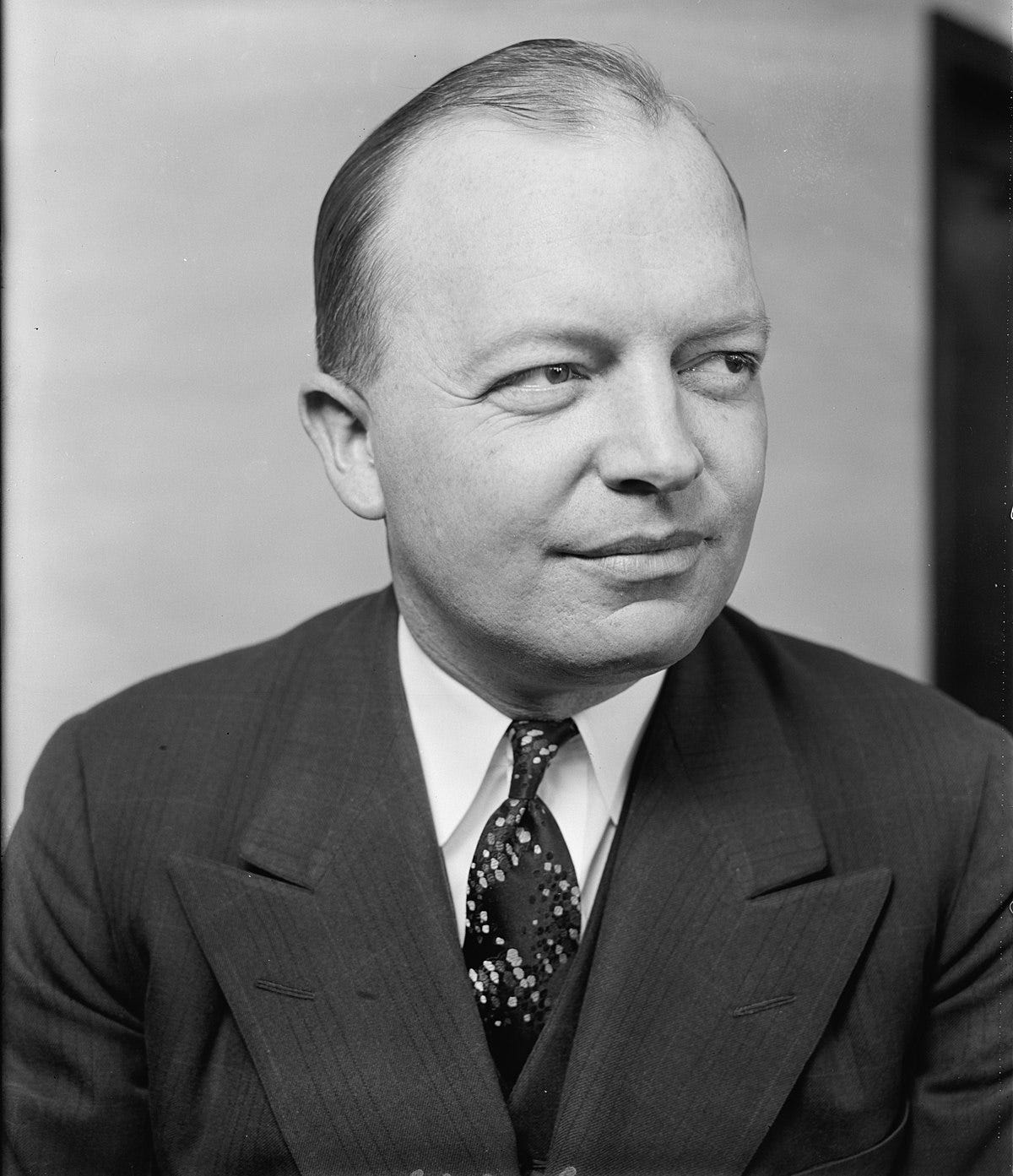
The Eisenhower boys were very liberal Republicans seeking to purge the GOP of anyone on the right. Dwight is today remembered as a kind of facile laissez faire country club Republican. Milton always portrayed himself as a “conservative.”
But would Henry Wallace have kept a press man on staff who was a conservative?
To answer that question I found this interesting article from a small paper in 1940 about Milton Eisenhower, before he was more well-known.
Here’s the key excerpt:
The article doesn’t make Milton out to be a reluctant Wallace staffer. It makes clear that Wallace purged his office of so-called Republicans. It says Eisenhower was part of Wallace’s “strategy board” — whatever that was.
These kind of ‘puff pieces’ in journalism are always written with the consent and involvement of the subject hand-feeding the facts to the lazy reporter. So Milton was no doubt feeding these details to the reporter, he was proud of the association at the time.
Milton and Dwight were an interesting pair. They seem to be the only two of the Eisenhower brothers that consciously and publicly worked together.
Both end up running colleges without graduate degrees. Both end up running exclusive and elite schools that are significantly populated with Communists.
It makes it seem as though Milton had somehow tapped into a certain academic ‘deep state’ that was able to make the right connections for his prominent and suddenly-famous brother. Dwight was elevated by FDR and George Marshall, and that newfound fame wasn’t very useful in peacetime.
It’s a major incongruence in Dwight Eisenhower’s biography: his brief tenure as President of Columbia University from 1948-1953. In the past 120 years, only two Presidents have also previously been college Presidents: Wilson and Eisenhower.
Woodrow Wilson was President of Princeton from 1902-1911.
Wilson was a long-time academic, had been approached to run other colleges, and was promoted from within Princeton. Eisenhower, by contrast, had no connection with Columbia, was not an academic, and was not promoted from within.
The reasons for Eisenhower’s selection are a bit vague and opaque. He was very well-known and popular in 1948, but the selection is still odd. But when one considers that his brother Milton had been a longtime academic, it doesn’t seem as random though it still doesn’t make sense.
No other prominent WW2 Generals or Admirals were offered roles as college Presidents. A few served on the boards of Universities though, but it was a rarity. I took the more prominent names and assessed their basic post-war careers:
Gen. MacArthur: Business
Gen. Bradley: Government, Business
Gen. Marshall: Government
Gen. Chennault: Government, Business
Gen. Doolittle: Government, served as a Regent to MIT
Gen. Clark: Government
Adm. Nimitz: Government, served as a Regent to the UCalifornia system
The story for Eisenhower’s pick at Columbia is that IBM’s Thomas J. Watson was on the Columbia board and wanted Eisenhower to run the college. The unofficial story is that almost every major Soviet agent had some weird nexus with Columbia University during this period of time.
Milton made at least some sense to be a college President, though not much of one. Milton Eisenhower was President of:
Kansas State: 1943-1950
Penn State: 1950-1956
Johns Hopkins: 1956-1967; 1971-1972
Notably here, Joe McCarthy-alleged Communist Owen Lattimore, previously mentioned, was on faculty at Johns Hopkins from 1938-1963. Lattimore had also been close with Henry Wallace, serving as his translator and tour guide on his infamous trip through Asia where he visited Soviet death camps in the Arctic.
Sen. Joe McCarthy accused Lattimore of being the “most dangerous man in America” as a Soviet sleeper agent. Lattimore ran a Soviet-friendly journal, the Institute for Pacific Review. The IPR’s journal was Amerasia, and it was caught in 1945 stealing and publishing confidential government secrets in what became known as the Amerasia Spy Crisis. No one was prosecuted.
So what seems to be going on is that American uniparty elites wanted Eisenhower to have a soft landing and they chose Columbia. Why they didn’t pick any number of the country’s 2,000 other liberal arts colleges, one can only speculate.
But they were clearly grooming Eisenhower to run for office in 1952.
Truman was wildly unpopular due to his mishandling of the Korean War, in addition to his constant coddling of Soviet espionage agents. It was set to be a great election cycle for Republicans.
And Robert Taft was running again for the third time, and they couldn’t bear the thought of that.
Ike booster, and Columbia board member, Thomas Watson also had a personal beef with Taft. He had been criminally indicted under the elder Taft’s Presidential administration. So perhaps some of this was pure self-interest.
But the elites couldn’t just trot out Wendell Willkie again, since he had died in 1944.
Wendell Willkie was likely the fake choice for Republican President pushed by elites and British intelligence in 1940. They wanted to stop Sen. Robert Taft and Willkie was their man.
In 1952 is it that hard to imagine that those same elites would want to foist Dwight Eisenhower on the public? After all, they wanted to stop Robert Taft, again. Willkie had drunk himself to death by 1944 aged 52, so they couldn’t run him again.
Who better than Dwight Eisenhower?
A friend who knows one of the last surviving delegates from the 1952 GOP primary election claims that convention shenanigans were used to ensure a Taft defeat. Certain delegations were seated while others who were properly elected, were turned away. Delegations from the conservative south were filled with obvious liberals and yet the credentials committee let in anyone who would advance Eisenhower and turned away anyone who would not.
In 1940 the guy determining the credentials of who got let into the convention was tied to the Rockefeller family. In 1952, the Eisenhower convention expert Malcolm Moos, was advising them on how to win the election and was also a Rockefeller employee.
Elections are easy if you control who gets to vote, or who counts the vote, or who decides which votes count.
Eisenhower wasn’t the choice of actual Republicans, he was the choice of a money elite who knew he could easily win a general election if they could just shoehorn him in past the convention delegates.
I’ve anecdotally heard from Republican old-timers that the only convention that felt truly organic was the Goldwater convention. Everything else was kabuki theater to steamroll the anointed one. That same dynamic seems true today. Having been at my fair share of conventions, that isn’t hard to believe.
Here’s a news story indicating Texas sent two competing slates of delegates to the Republican convention in 1952, one for Taft and one for Eisenhower. It was then up to the National Committee to decide whom to seat at the convention. The Eisenhower delegation were “not Republicans” according to people within the state party.
And if the Eisenhower faction was close with Malcolm Moos, he could have helped them steer success at the ‘52 Convention to defeat Taft. With a little bit of research, that thesis appears to be correct.
I repeatedly wonder and worry if I’m presenting sane and coherent theories to you all, or whether this is all fantasy and perhaps projection.
This was the GOP ‘Deep State’ controlling conventions to get internationalists and pro-Communist agents put into positions of national power.
And I want to be careful about delineating between people who are just honest liberals and those who are active Soviet agents. There’s a huge bit of difference between the malice and criminality between those two positions, even if they might not disagree much ideologically.
Liberals can be wrong about things, but honest liberals are rarely doctrinaire and consistent on every ideological issue. Honest liberals don’t burrow into positions of power and then chronically abuse that power to achieve the worst possible ends. I think a good way to distinguish between a misguided liberal and a Communist is when one sees evidence of malice, dehumanization, and fatalities.
I don’t think the honest liberal is content with body counts in the same way that a Communist typically is — the Communist cares nothing for human material, whereas the honest liberal would change a policy if it were found to be chronically oppressive and wrong.
The Eisenhower administration encouraged the French to fight to maintain Vietnam and then when they asked for air support at Dien Bien Phu in 1954, they were rebuffed, resulting in an amazing Communist victory.
Eisenhower told the French that he was committed to providing overwhelming American air power. Then he changed his mind once the French were committed after talking with British intelligence.
The Eisenhower administration encouraged the Hungarians to rebel in 1956, promising American support. When the tanks started rolling in, the Hungarians were on their own. The rebellion helped smoke out the remaining dissidents in Hungary and helped the Soviets brutally crush all resistance.
And yet Eisenhower is typified as a kind of godfather of the Cold War. If losing is your lodestar, then Dwight is your patron saint and Milton is his chief intercessor.
Sen. Joe McCarthy referred to Milton as “one of the most left-wingish men you can find in the Republican Party.”
Now, that might seem like a loaded statement coming from the most demonized Senator in U.S. history.
So when Dwight and Milton’s own brother Edgar says:
Then maybe there’s something to the criticism.
So I was curious to find a ‘debunking’ article from 1956 by Roscoe Drummond arguing as to why Milton Eisenhower was not a Communist as alleged at the time.
As usual with the media, sometimes you know the truth by the opposite of whatever the media is claiming.
Here is the editorial, and here is a rundown of the arguments Drummond attempts to ‘debunk’ about Milton Eisenhower being a Communist agent:
Milton worked for Henry A. Wallace
Milton served as the first Chairman of the U.S. National Commission for UNESCO
Milton advocated world government in a 1947 speech in Wichita
Milton wrote a reference letter for Esther Brunauer, who was a Communist sympathizer trying to work in Atomic Energy and whose husband was a Communist.
Milton asked likely Communist Owen Lattimore to make a speech in 1943
These all seem pretty legitimate criticisms to me. The author ‘debunks’ the claims by pointing out how great Dwight is, so they couldn’t possibly be true!
Amusingly the author is Roscoe Drummond. Drummond was the “Director of Information” for the Marshall Plan. The George Marshall plan. The George Marshall who is best friends with Dwight Eisenhower plan.
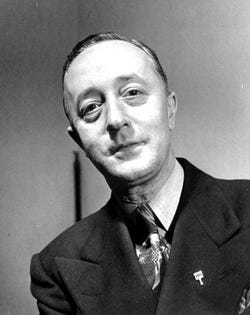
Milton had his own Presidential aspirations. Articles in 1956 and 1960 suggest he should be the Presidential nominee. His brother Dwight even explicitly said Milton should be the 1964 nominee instead of Barry Goldwater.

Something inspired me to look into the claims by the John Birch Society that Dwight Eisenhower was a Communist. I had heard these claims and objections only in the vaguest of terms. This led me to a pamphlet hosted on Archive.org that is a private writing by John Birch Society President Robert Welch laying out his arguments against Dwight and Milton, entitled “The Politician.”
And I want to just admit right now that I was shocked at how well Welch laid out his case.
Welch’s arguments against Dwight are, generally speaking:
Allowing Communism to expand across the globe in the 1950’s
Allowing the Soviets to seize Berlin and Prague at the end of WW2 even though both cities were begging to surrender to the Americans.
He begged to become an FDR stooge in 1940 via the President’s daughter Anna and thereafter had a meteoric career advancement as a result of that connection and his own personal politicking and political finesse even though he never saw combat.
Eisenhower aggressively pushed for Operation Sledgehammer, which would have invaded Europe in 1942 at great human cost, which he privately admitted were probably just pointless sacrifices. The only beneficiary of this bloodletting would have been the Soviets.
By focusing on France to open a second front, Eisenhower left the Balkans open to Communist subversion and political control. He also took troops from Italy and pointlessly split American forces.
Operation Keelhaul: the forced repatriation of Russian civilians and displaced military personnel, at least half of whom were immediately executed, sometimes within earshot of the American personnel.
The forced repatriation of the Russian Liberation Army, in violation of the Geneva Conventions, most assuredly a war crime of the highest order.
Eisenhower negotiated the access to occupied Berlin on a solely verbal agreement with the Soviets, virtually ensuring the inevitable Berlin Crisis and blockade of 1948.
The origin of the infamous Morgenthau Plan, another war crime in the planning, came about from a meeting Eisenhower called in August 1944. The plan was drafted by now-known Soviet spy Harry Dexter White.
Eisenhower was about to try the Germans at Nuremberg for the Katyn Massacre and, when it became obvious that it was a Soviet crime, helped to cover up the evidence.
Eisenhower’s war memoirs, “Crusade in Europe” was ghostwritten by Joseph Fels Barnes. Barnes was an editor at the Institute for Pacific Review with Owen Lattimore. Barnes was also named by Whittaker Chambers as a Communist agent.
The left-wing media smearbund never attacks Eisenhower, not over the Kay Summersby affair, being drunk on the night the Battle of the Bulge started, or over his many missteps in the press.
Eisenhower had a wealthy patron, who was also a co-founder of the ADL, Leonard Finder, go to New Hampshire, buy a controlling interest in the main newspaper there, to ensure that he would ‘win’ the state and then promptly sold his entire interest in the paper shortly thereafter.
Eisenhower blocked Congress from getting any information about the Executive, and specifically about loyalty investigations, into any area of the administration. This was even more extreme than his predecessor Truman.
Eisenhower referred to efforts to remove pro-Communist books from U.S. ‘information centers’ as akin to ‘book burning’ and compared the effort to Hitler; the Eisenhower administration funded the acquisition of Communist books for American centers abroad.
Eisenhower was named to the board of the Carnegie Foundation for International Peace on May 6, 1948, a year prior to the resignation of Alger Hiss as the Executive Director. Hiss started at Carnegie in December of 1946. Eisenhower was on the board of Carnegie with Philip Jessup, overseeing Hiss as Executive Director, until Hiss’ resignation on May 6, 1949.
Eisenhower vouched for Philip Jessup who was heavily involved in Lattimore’s Institute for Pacific Relations.
As President of Columbia, Eisenhower took money from Communist Poland to set up a “Polish Studies Department” that became a propaganda arm for Communists, with one professor resigning in protest over the matter.
Eisenhower signed a report that said Communists should be allowed to be teachers, and ignored and refused to accept, evidence of the massive Communist penetration of the Columbia faculty.
Welch says that he personally asked the Eisenhower campaign committee for a representative to come out and debate a Taft speaker in 1952. The Eisenhower campaign sent out someone named Raymond V. Dennett.
Eisenhower pushed for a version of nationalized healthcare.
Eisenhower refused to hire Republicans into political appointee jobs within his Administration.
Eisenhower refused to raise money for the Republican Party, so it was constantly losing elections that were otherwise winnable in the 1950s.
Eisenhower bragged while President that half of all farm income came from federal subsidies.
Eisenhower created the “Health, Education, and Welfare” Department in the Executive Cabinet, adding 31,500 federal employees.
Eisenhower shamefully left 3,421 Allied troops behind in Korea, 90% of whom were Americans (~3,079).
Here’s what Welch says in “The Politician” about Raymond Dennett campaigning for Ike:
What Welch alleges here is completely backed up and verified by Hiss’ FBI file. Welch couldn’t know this in 1958, because this fact was buried in Alger Hiss’ FBI file and would only come out much later, is the following excerpt from page 23 of this part of Hiss’ file:
This further validates the accuracy of what Welch was writing in 1958.
Dennett worked for the “World Peace Foundation” and Hiss was on their board. Dennett is whom the Eisenhower campaign sent as a speaker for their campaign events. Ike sent friends and employees of Alger Hiss out to campaign for him.
A good friend also notes these problems with Eisenhower:
Eisenhower’s 1956 letter to Tito that signaled that America would not support the Hungarian revolution - this being the ‘green light’ Moscow needed to invade and crush the revolt.
The deportation of Russian civilians who fled during the Russian Civil War and were never Soviet citizens. Men like General Peter Nikolayeff Krasnov, author of “From Double Eagle to Red Flag”
The story of the death of General Krasnov by his grandson Nikolai as told in the 1960 book “The Hidden Russia” - which relates the story of the deportations and murders facilitated by Eisenhower.
As this friend is want to note, Germans were hung at Nuremberg for less than what we know for certain Eisenhower participated in.
Ike also then says that he never knew a “New Dealer" during this period of time.
Yet his brother Milton was a ‘New Dealer’, he was working for one who became FDR’s Vice President. Dwight is just lying.
I’ve shown you the newspaper clipping where Milton bragged about being a “New Dealer.” Eisenhower was in Washington during the period of time Milton was — he knew this isn’t true.
It’s a galling lie. Just a profound lie.
There are plenty of big picture reasons to dislike and hate Eisenhower. But I don’t know what it says about me… but this kind of basic lie, this petty bourgeoisie lie, bothers me the most.



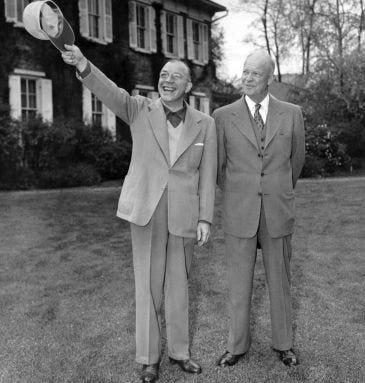



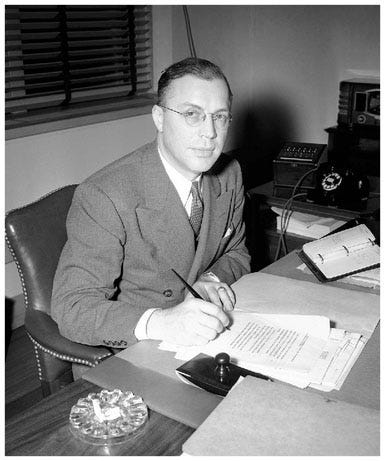
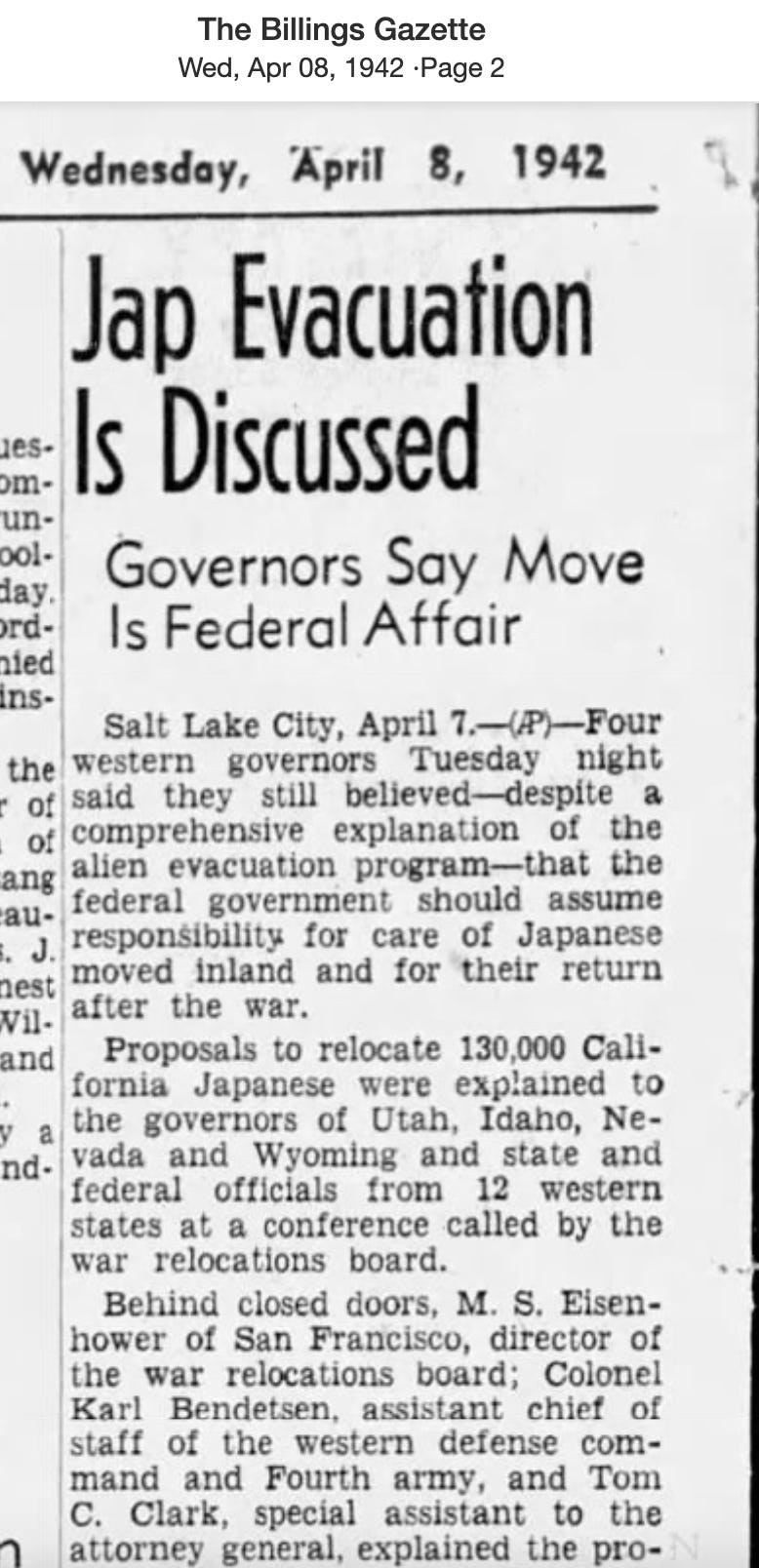
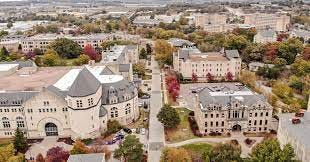




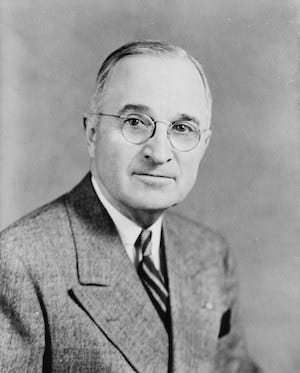

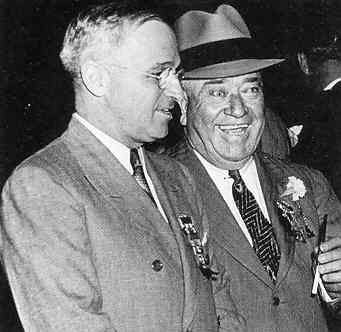


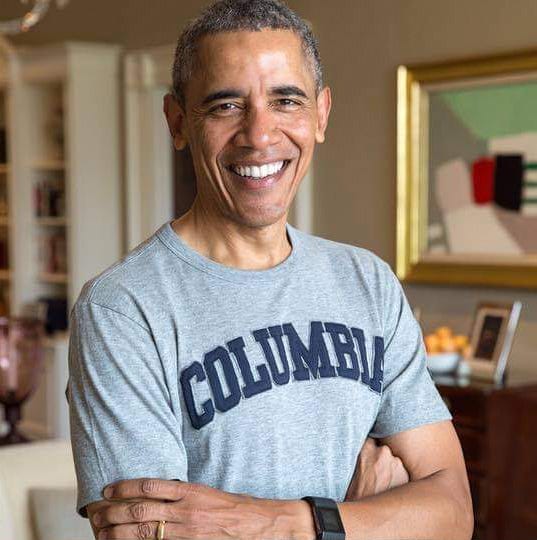
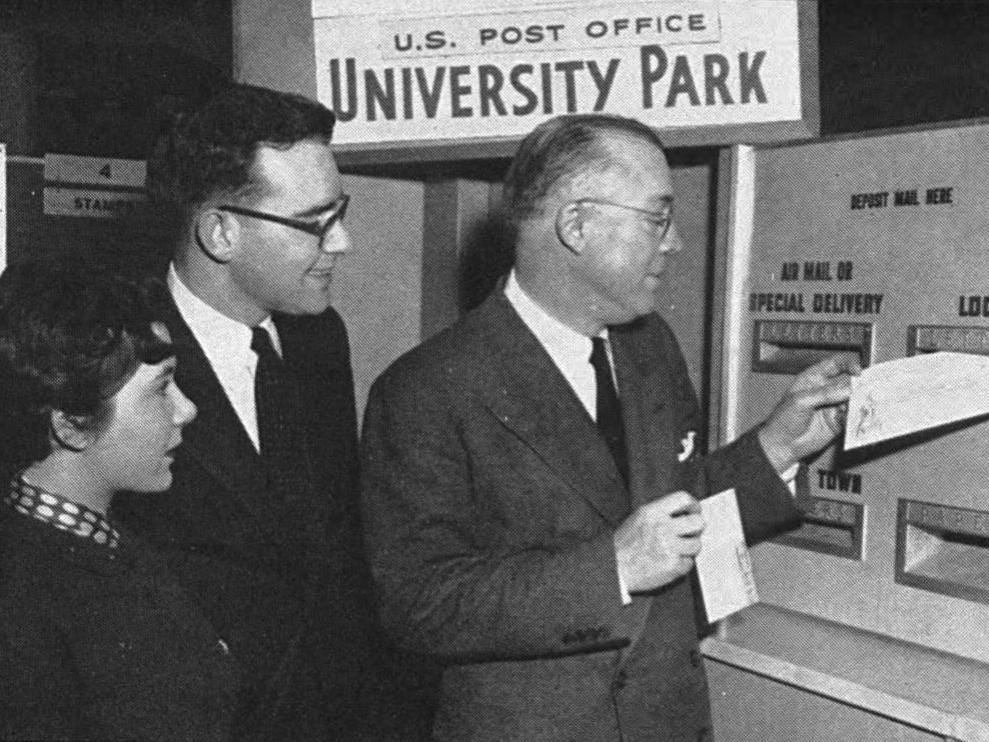

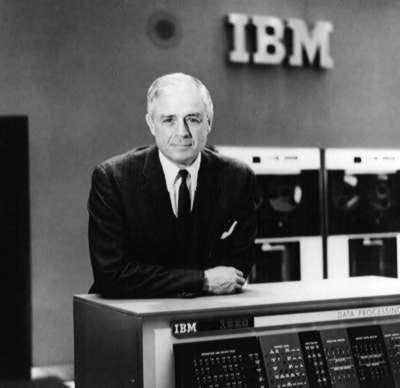
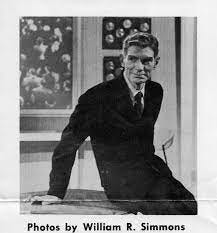

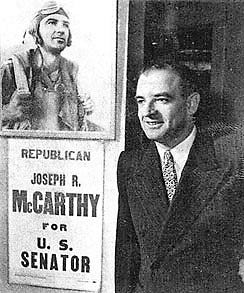





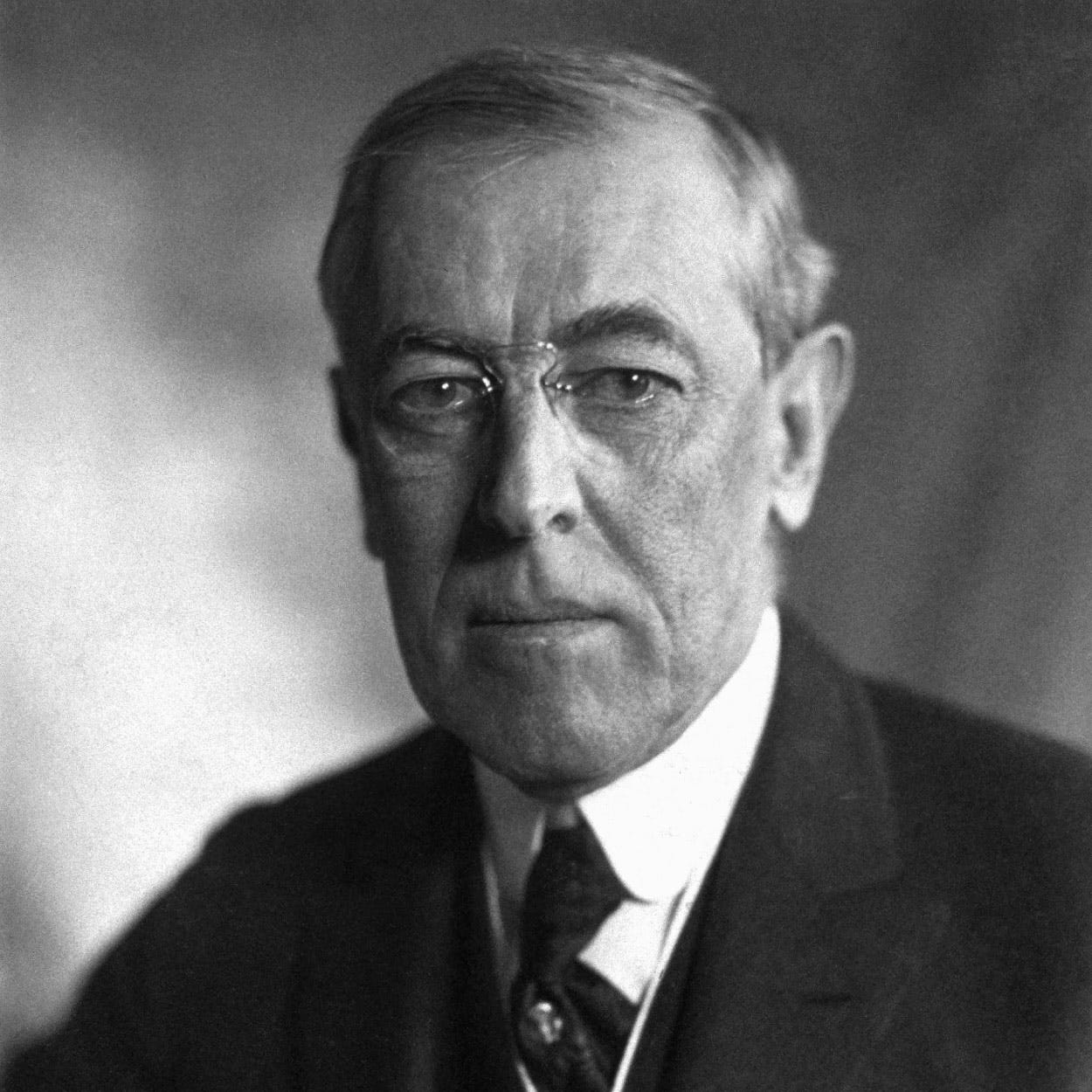

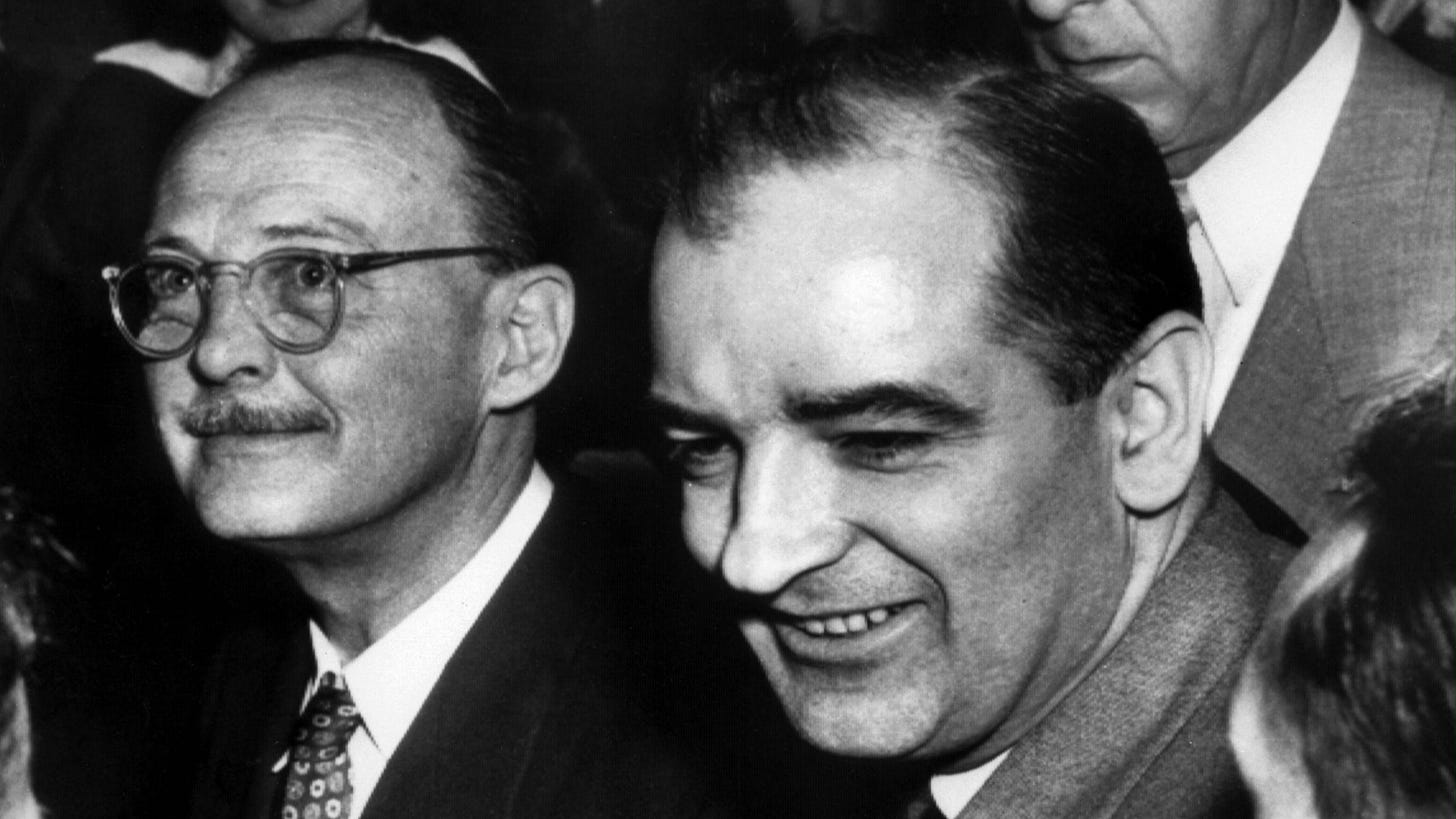
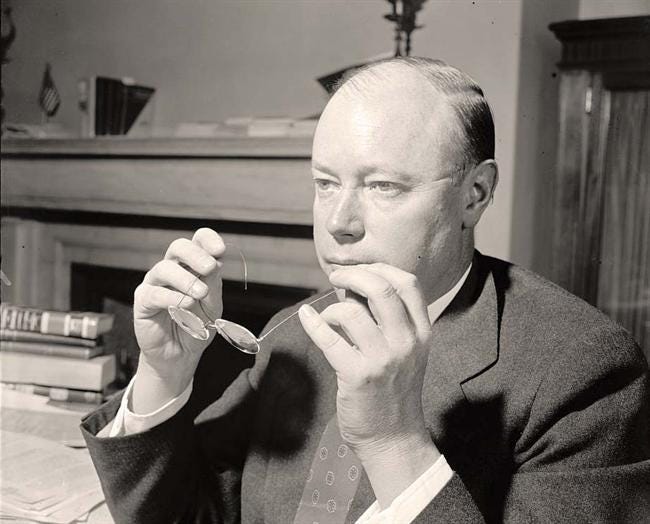

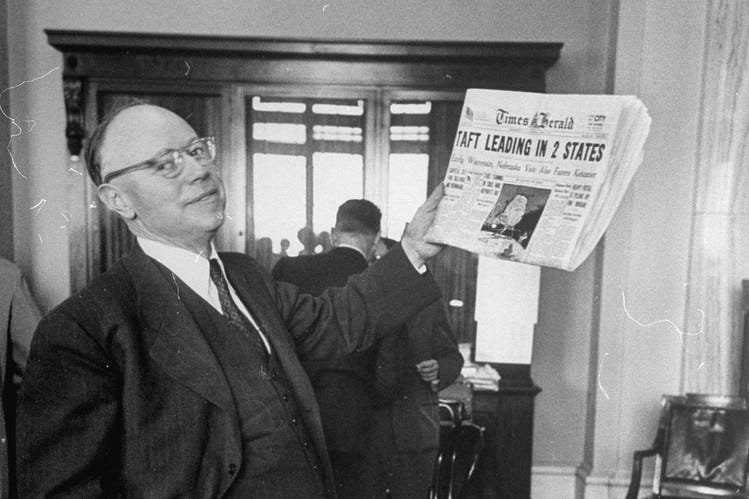
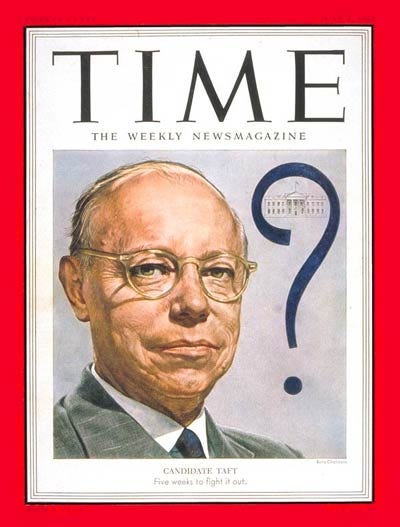
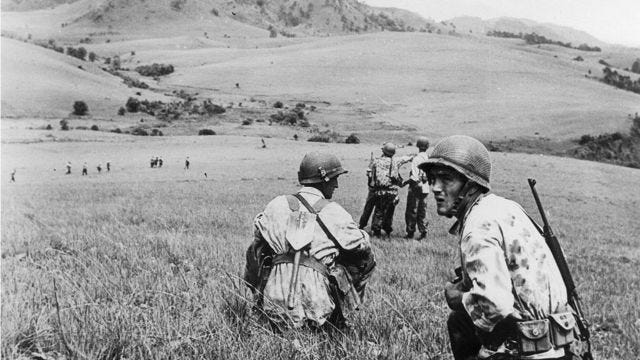
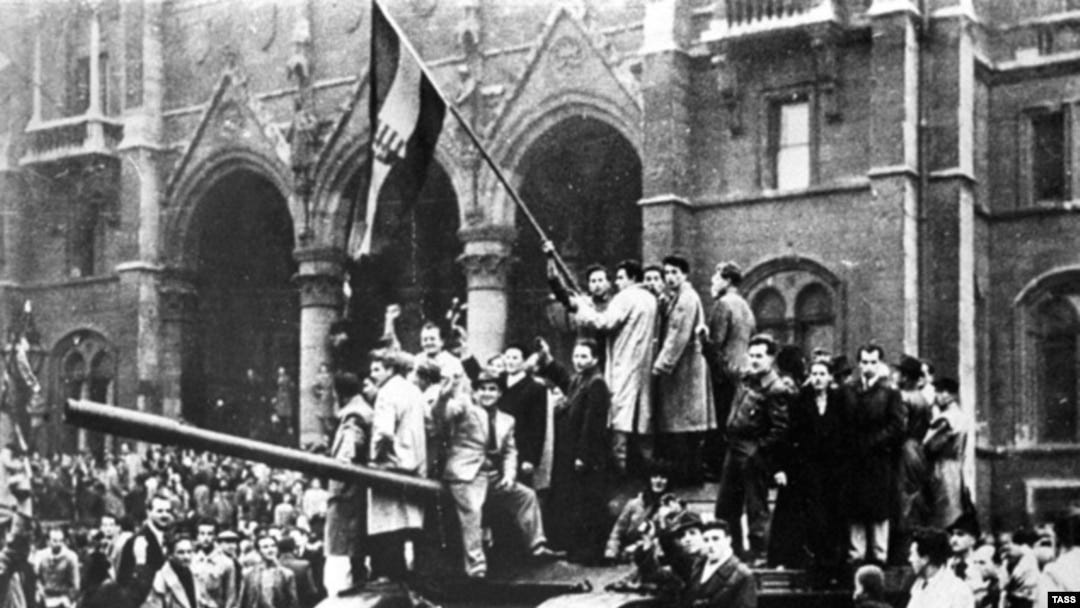

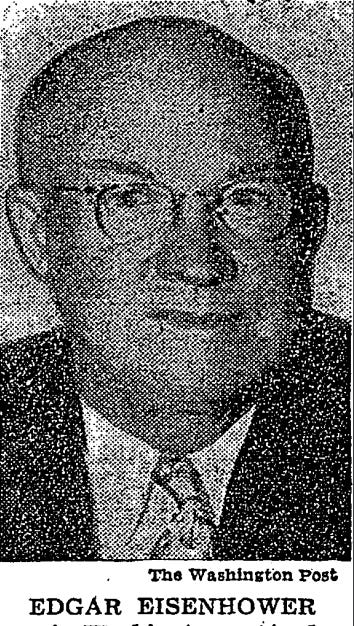










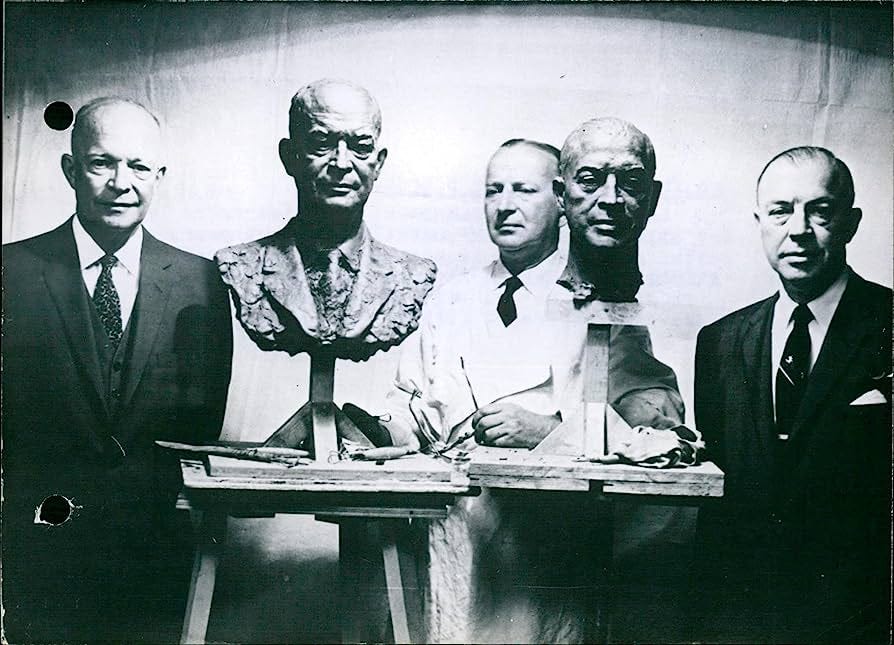
1. I need to edit a previous comment. Eisenhower, not Truman.
2. You could make a career just captioning photos. "The body of Abraham Feller in 1952, formerly of the United Nations. Close friend of Alger Hiss & asphalt. One Dead Feller." Reminds me of young PJB writing headlines for a local paper: "Nut Bolts, Screws".
3. I never even heard of Milton Eisenhower until you wrote about him. Contrast that with other Executive Branch brothers of the 20th century: JFK / RFK, John Foster and Allen Dulles were all over my formal education. Why not Milton?